
We use Google Cloud Translation Services. Google requires we provide the following disclaimer relating to use of this service:
This service may contain translations powered by Google. Google disclaims all warranties related to the translations, expressed or implied, including any warranties of accuracy, reliability, and any implied warranties of merchantability, fitness for a particular purpose, and noninfringement.

Highlights
- Even the child Ramakrishna used to sing the song of life sung by his mother. Mother used to sing the village bhaka. Lok, used to sing and dance, Ramakrishna also used to sing along with his mother. Mother is encouragement, inspiration and charioteer for Ramakrishna who has melodious singing.



Like the singer Ramakrishna Dhakal, her mother is not found in the voice, in the mind of the audience or in the pages of the book. However, she is always in Harsas - Chandramaya Dhakal. His mother lives on just as vividly in occasional dreams, flashbacks and childhood memories.

He has private and 'ordinary' memories of his childhood spent in the warm embrace of his mother. He thinks that ordinary memories become really precious when the characters who lived in those memories disappear from the world. Like when the mother disappeared forever, Ramakrishna's memories slowly came to light.
A mother's love is dearer than herself
A father's love is more difficult to forget
When you let go of that hug of love
My world became dark
In these words of the song sung by Ramakrishna - the expression of mother's love, the restlessness after mother's departure and Disappointment. After being separated from his mother's love, he feels that the whole world is dark. After mother left the world, that embrace of love disappeared forever – that gentle, warm and sweet embrace. The memories of those hugs make his eyes tear.
After his mother's departure, singer Dhakal thinks - the love of others is getting tougher. There are many hugs in the world - of love, of compassion, of mercy, of fear, of deception, Of faith, of disbelief, of union, of separation, of strangers... ``The warmest, sweetest hugs are only from mothers,'' recalls Ramakrishna. To say that life is probably a long chain of happiness-sadness-restlessness-quickness-disappointment. Ramakrishna feels that his mother is always coming/going in that series. And, as his song above says, his world turned dark after losing the embrace of his mother's affection.
***
Before Ramakrishna, there were different names of Nepali singers, who were sitting in the Virat position. However, Ramakrishna, who came from deep sorrows, became a different and unique name. The memory of 'Maya Gurneke Chokho Maya' will never be erased to those who listen to his songs. The contradictions of time and life are the words of his songs. He has extremely 'hit' numbers - 'Orali Lagai', 'Hira Katne', 'Daiv Tero', 'Lovers are found in a thousand ways', 'Maya Gurneke Chokho Maya', 'Risehode Ni Owne', 'Banchunjelilai', 'As soon as you wake up in the morning'. , 'This life has left me', 'The bird has left me', 'Snow in the snow', 'Mero Khukuri', 'This is not all that is said'...
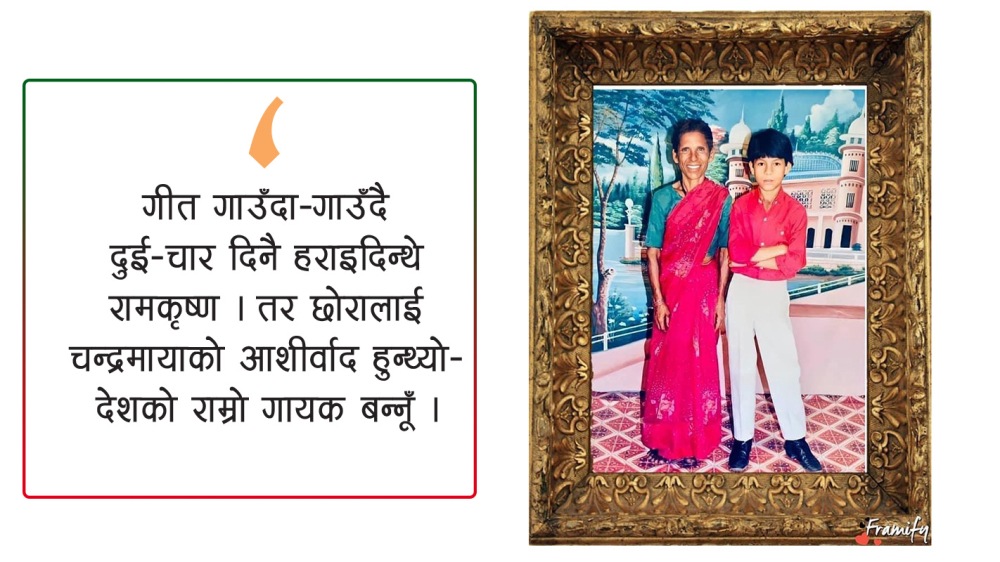 This soft-emotional singer continues to sing - 'God, your love has made me this fast today, for whom I have lived and left before reaching half way' . After hearing that, his sources believed that this singer sang my story. In this way, the song of Ramakrishna, who has been binding the Nepalese society for 35 years with his voice, has- love, separation, compassion, pain, affection, despair, sorrow, hope...
This soft-emotional singer continues to sing - 'God, your love has made me this fast today, for whom I have lived and left before reaching half way' . After hearing that, his sources believed that this singer sang my story. In this way, the song of Ramakrishna, who has been binding the Nepalese society for 35 years with his voice, has- love, separation, compassion, pain, affection, despair, sorrow, hope...
His albums 'Ashirwad' (050), 'Ashish' (053), 'Asha' (055), 'Aroah' (056) 'Agraha' (058), 'Aadhaar', (059), 'Ashray' ( 061), 'Agman' (063) continued to give hope to Nepali music. So these brand singers are actually the 'hope' of Nepali music. Ramakrishna is always climbing uphill in life and singing even though the song says 'Orali Lagai Harinko Chal Bho'.
***
If you listen to Ramakrishna's mother's life song, you will find the child Ramakrishna singing - When I seek heaven, I see my mother / When I seek God, I find my father / In this heartbeat / I see Nepal throughout my chest.... Ramakrishna, who is a prodigious singer, is the inspiration, inspiration and charioteer of his songs - his mother. In the village she used to sing and dance folk songs. Ramakrishna also used to sing along with his mother. Chandamaya used to sing the bhaka of the village, which was the subject of her sorrows. Chandamaya used to be very happy when her son sang. While singing
songs, his mother's face kept repeating in Ramakrishna's mind. At that time, she was poor in understanding mother-figure, mother-sorrow. "She didn't have a very happy and joyful life, tears of sadness were the rhythm of her mother's life," says Ramakrishna. He sees a mirror image of his mother's life - a rural woman, worn out and exhausted by work, fatigue and sweat.
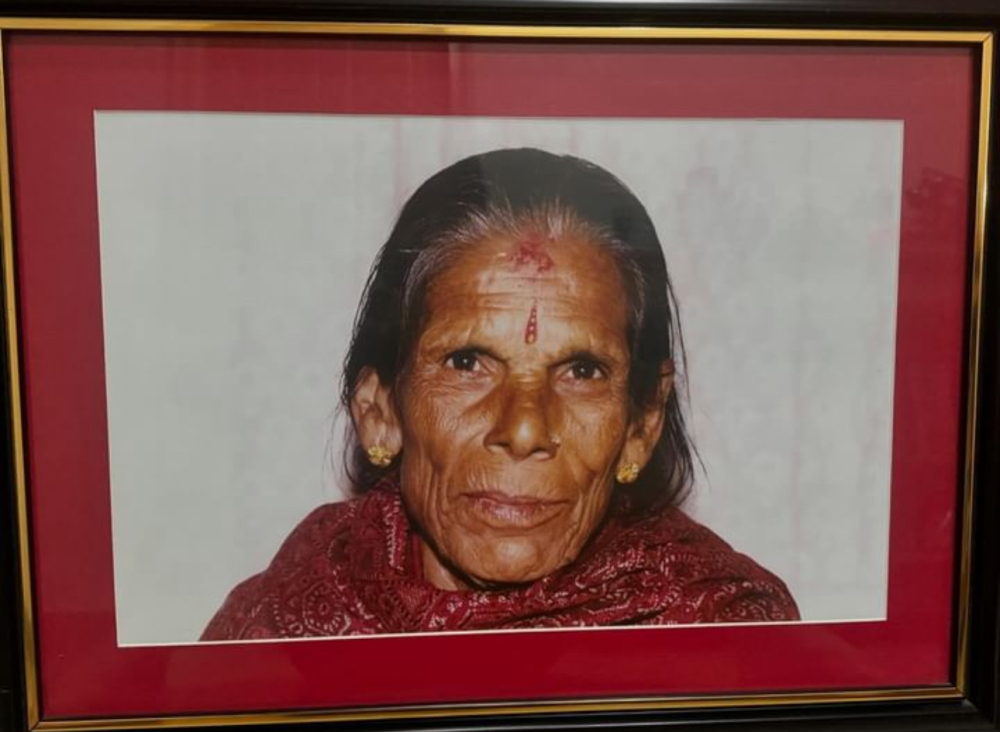
Ramakrishna was born in Nijgarh. The Dhakal family kept migrating, Nijgarh-Parwanipur-Simra-Chitwan. All the surroundings were rural. A herd of cows-buffalo-goats returning home with their hooves blowing dust in the twilight, followed by a mother walking home carrying a load of grass on her big head and the farming environment! These are the images that come to Ramakrishna's eyes when he remembers his mother. "My mother comes from a rural background," says Ramakrishna. Mother used to take care of the household. "Mother's life was spent in farming, from grass to firewood," says Dhakal, "she lived a struggling life."
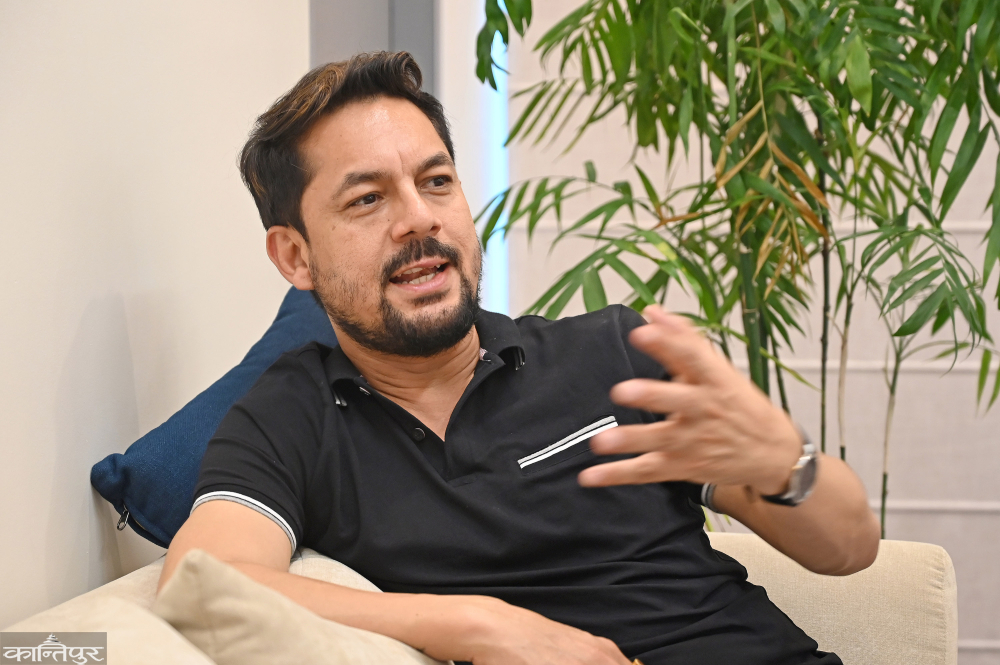 singer Ramakrishna Dhakal. Photos: Angad Dhakal/Kantipur
singer Ramakrishna Dhakal. Photos: Angad Dhakal/Kantipur
Father Shivprasad was capricious - sometimes he wandered, withdrew from financial affairs, sometimes he did not come home, sometimes he disappeared! "My mother was very sad when my father did not fulfill his duties," he says. All the responsibility was on the shoulders of mother Chandamaya. Every autumn, winter, spring, summer or winter, she used to go to the forest with her head and came home with grass or firewood. Chandamaya has 4 sons and 1 daughter. He got up.
There is only one image of mother in Ramakrishna's eyes, 'He carries a heavy load, chops firewood, brings firewood from the forest.' They had many lands in Simra. "After my father did not show interest in the household, my mother had to look after all that," he says, "Then we sold the land." A single mother could not handle it. After that, we had to migrate. Ramakrishna's education also stopped due to migration.
***
Ramakrishna's emotions and thoughts were guided by his mother's life experience. It helped to sharpen his perception. Ramakrishna's rural life was a mixture of many colors and feelings. Ramakrishna grew up close to his mother. Chandamaya used to cook dhindo, which she didn't like. Mother used to say - eat quietly. He used to eat stale rice in the evening with milk tea. They used to mix stale rice with mustard oil and salt. 'It would be boring to remember that food,' he says, 'I used to eat milk from the goat's udder. A mother who was always loved. I missed him very much.'
Ramakrishna is so stubborn and stubborn that he never forgets an old incident when he lived in Jitpur Parwanipur. The Ramakrishna family owned a hotel and a grocery store, which his mother managed. It was a big shop in the bazaar at that time, where hot bazaar was held on Monday. Chandamaya bought Ramakrishna a new half-shirt for 5 rupees at the market. She was very engrossed in some work . Ramakrishna liked to have tea. He was asking his mother for tea. Chandamaya was saying 'Ekchin Ekchin'. Ramakrishna said, 'Give tea, otherwise I will throw this shirt in the fire.' She did as if not listening. Ramakrishna threw the new shirt he had just bought into the fire. Chandamaya scolded her very much, 'How stubborn are you ? This habit did not happen.'
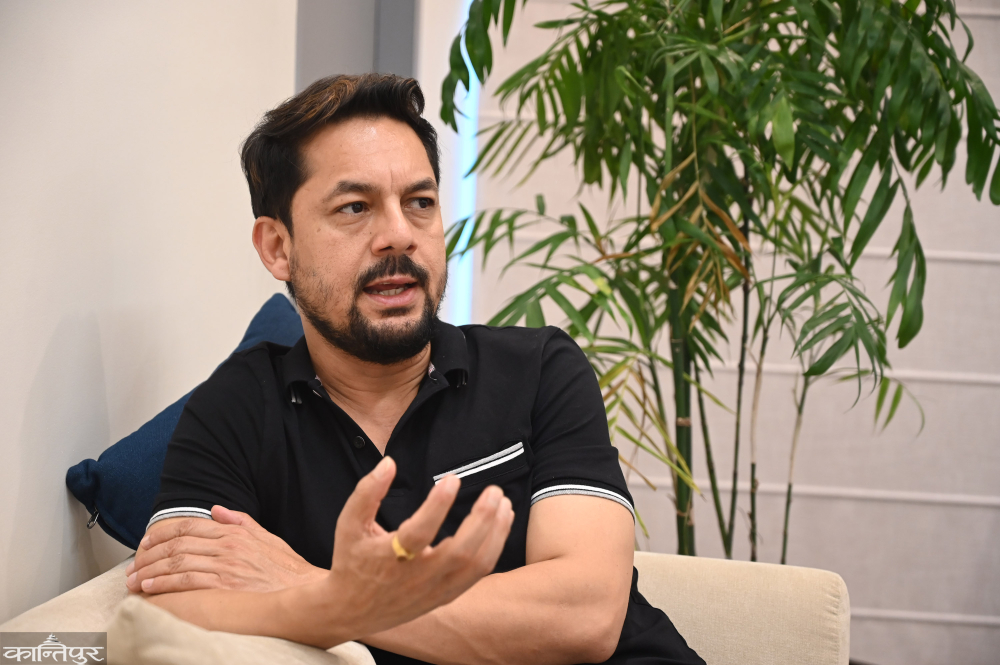 After migrating to Simra via Parwanipur and from Simra to Chitwan, their house was near Narayani river. Ramakrishna used to swim in the canal there. Ramakrishna was beaten by an old man wearing rubber slippers. He reached home crying and told his mother. The mother then argued with the old man. "Mother gave her life for the happiness of our children," he says. Ramakrishna doesn't have many memories with his mother, but the ones he has are very precious and memorable.
After migrating to Simra via Parwanipur and from Simra to Chitwan, their house was near Narayani river. Ramakrishna used to swim in the canal there. Ramakrishna was beaten by an old man wearing rubber slippers. He reached home crying and told his mother. The mother then argued with the old man. "Mother gave her life for the happiness of our children," he says. Ramakrishna doesn't have many memories with his mother, but the ones he has are very precious and memorable.
***
Ramakrishna used to sing songs, from childhood. He was interested in music. Mother used to encourage her to sing. He used to be in the crowd of people who liked to listen to songs, he used to come back late at night singing songs. Sometimes he would disappear for two/four days. A son who wanted to sing would be blessed by Chandamaya - he would become a good singer in the country! "I was inspired to sing by that blessing and inspiration," says Ramakrishna, "I used to sing from the age of five." People would take me in their arms and listen to the song.'
Came to Kathmandu, at the age of 11, driven by the dream of becoming a singer. "That's why I don't have many memories with my mother, I don't get very close to her," he says. Ramakrishna came to Kathmandu in 043. He says, "I was hardworking since childhood, I used to have some money. I used to go home even remembering my mother. But, for a long time, I could not blend into the life of the village.'
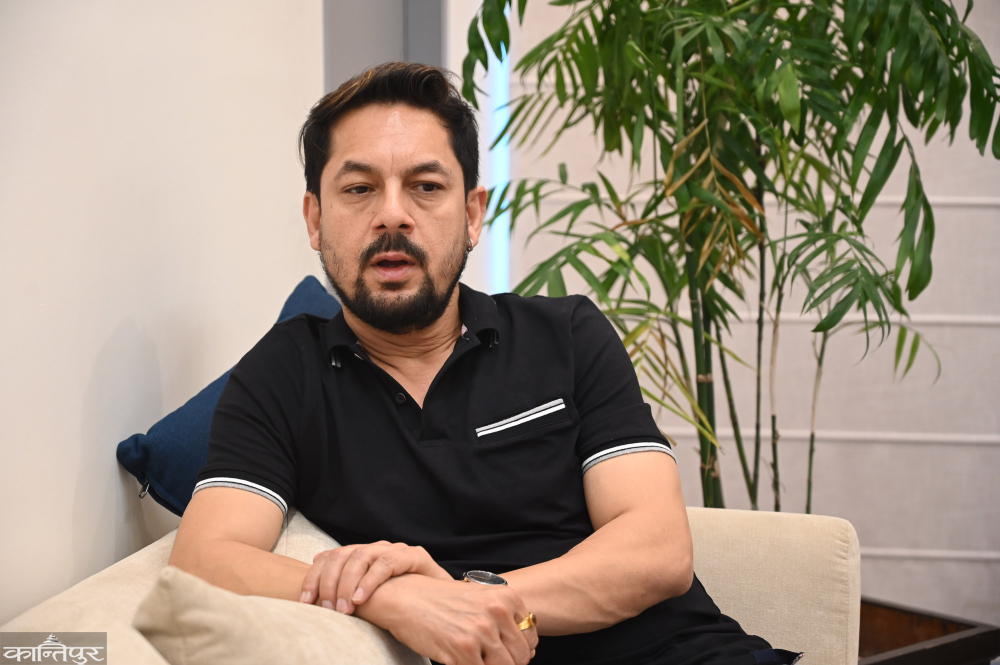 In the beginning, Ramakrishna had a fierce struggle to become a singer. He started his singing journey by singing songs of Narayan Gopal. He sang 22 Hindi-Nepali songs at the National Auditorium for the first time on 045 June 25 at 'Dhakal Sumdhur Ekal Sanjh', when he was only 13 years old. That show was sold out. Ramakrishna became a celebrity in childhood.
In the beginning, Ramakrishna had a fierce struggle to become a singer. He started his singing journey by singing songs of Narayan Gopal. He sang 22 Hindi-Nepali songs at the National Auditorium for the first time on 045 June 25 at 'Dhakal Sumdhur Ekal Sanjh', when he was only 13 years old. That show was sold out. Ramakrishna became a celebrity in childhood.
People say – Ramakrishna rose from the street. But, he says, 'It's not like that, I used to sing in the car. I am not singing without eating. That was my pleasure. Instead, after coming to Kathmandu to fight, he slept on the street one night. He says, "When I first came to Kathmandu, I ate 2 eggs in a box in Veer Hospital and slept in a sack in the month of Pus, but I was not poor and slept on the street like that." Nowadays, he thinks - those struggles brought me here, those past days taught me to live. Those were my university days. Those days have taught me to be patient, not to panic, endure and get out of ups and downs.
He also used to sing in long-distance buses, becoming a popular singer among bus drivers at an early age. To become a singer, he ran away from home with a wrestler and even reached India - he reached Sugauli, stayed for a few days and ran away and returned home. "He said he would take me to Bombay, but he didn't feel like doing anything, so I returned," says Ramakrishna. Returned by train after a week. Raxaul was caught by Titi, he was also released after singing a song.
Ramakrishna, who had come to Kathmandu from Chitwan to meet Thulbuba, did not find him, so he went back to the bus park, thinking that he would return home. There were drivers who knew him. While reciting songs there, Gopal Karmacharya saw Ramakrishna and said - I will teach you, I will teach you music, stay with me. Then Ramakrishna stayed in his house for 3 years. Send news to mother in the village - I am well, don't panic, take care of yourself. And then he was engrossed in singing. From 048 Surahi started singing ghazals in Soltimod restaurants, camped in Ghattekulo. Dera Mitra was – Tabla player Sunil Aryal. Tika Bhandari played the guitar in the restaurant, Sushil Vishwakarma played the mural, Kiran Kandel played the keyboard.
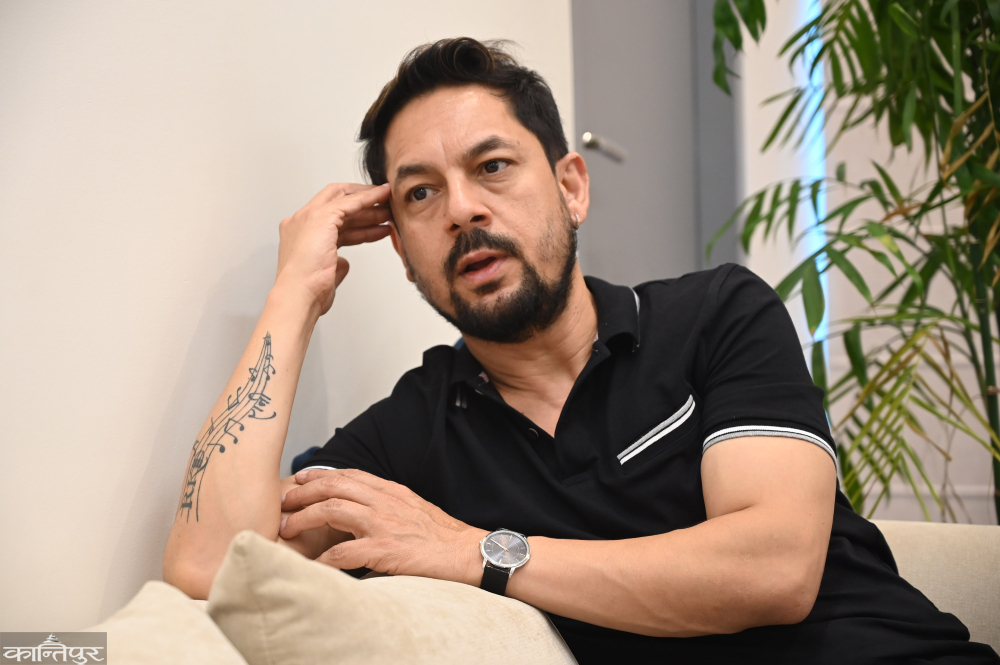 first album 'Ashirwad' made him more popular. His album 'Asha' made record sales of 5 lakh copies. After passing the voice test from Radio Nepal, he came second in the modern singing competition, in 049.
first album 'Ashirwad' made him more popular. His album 'Asha' made record sales of 5 lakh copies. After passing the voice test from Radio Nepal, he came second in the modern singing competition, in 049.
***
After building a house in Kathmandu, Ramakrishna's mother came to the city. Ubela said, "Father, you are making good progress, singing." However, she did not stay in the city for long. Parents seem to love the village more than the city. Village relatives and neighbors are having fun. Friends who tell their stories are in the village. Therefore, even if he came to Kathmandu, he used to return to the village,' says Ramakrishna. I couldn't keep him with me all the time.'
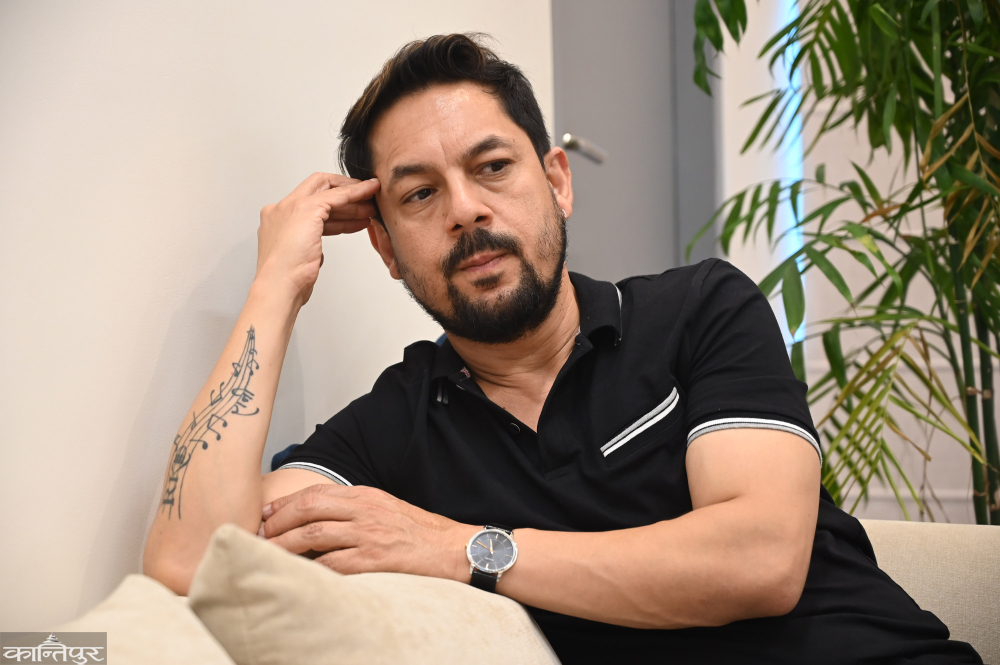 Chandamaya was very proud - her son became a great artist of the country, a person known to all Nepalis. "It is my mother's blessings, encouragement and love - that I am here," he says. Ramakrishna thinks that listening to someone's song or reading a story is not enough to understand mother. There is a deep relationship that cannot be understood somehow - mother.
Chandamaya was very proud - her son became a great artist of the country, a person known to all Nepalis. "It is my mother's blessings, encouragement and love - that I am here," he says. Ramakrishna thinks that listening to someone's song or reading a story is not enough to understand mother. There is a deep relationship that cannot be understood somehow - mother.
Chandamaya passed away in 76 years. Ramakrishna is having a hard time - I was not able to stay with my mother during her last days. "That's a guilt and my heart is always heavy remembering it," he says, "I was busy with city life. But, I had the good fortune to perform the last cremation.
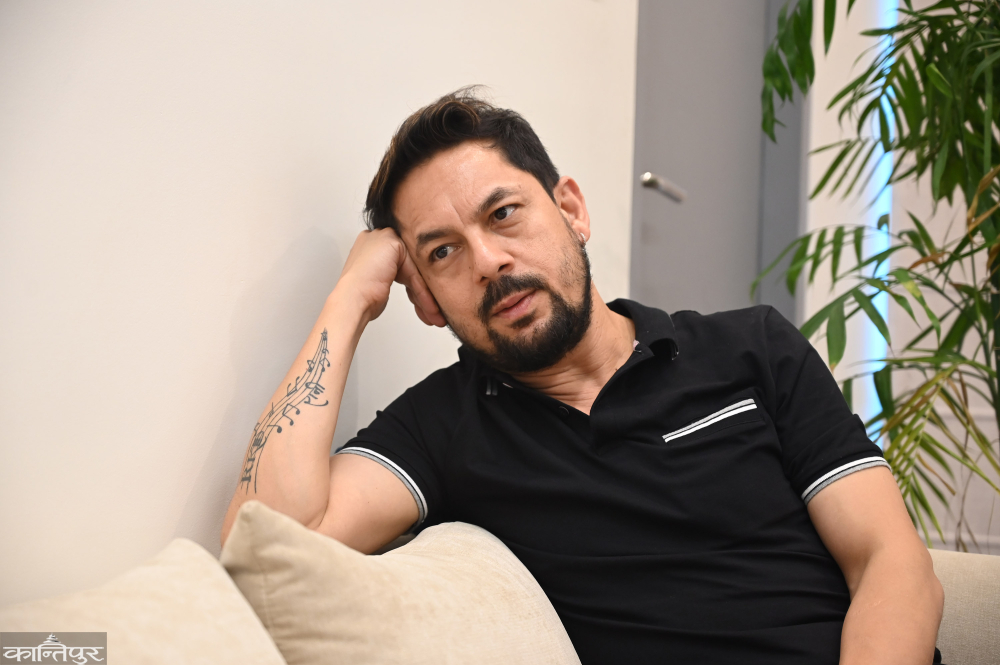 He thinks that worshiping his mother by remembering her wishes will show her true respect. They want to sing real songs about their mothers. She feels that being a mother is a tender, emotional and struggling life story. This dreamer of singing has an incomplete experience of a protective mother every now and then.
He thinks that worshiping his mother by remembering her wishes will show her true respect. They want to sing real songs about their mothers. She feels that being a mother is a tender, emotional and struggling life story. This dreamer of singing has an incomplete experience of a protective mother every now and then.
 प्रकाशित : भाद्र ११, २०८१ ०९:२५
प्रकाशित : भाद्र ११, २०८१ ०९:२५

 २५.१२°C काठमाडौं
२५.१२°C काठमाडौं











